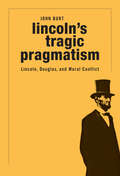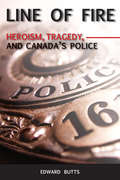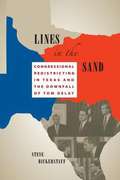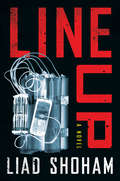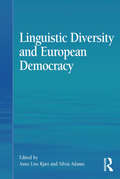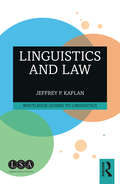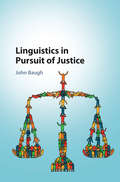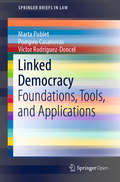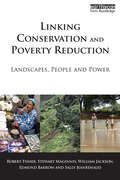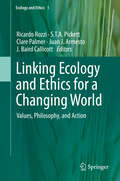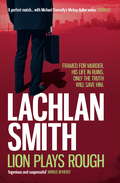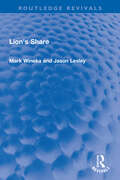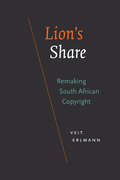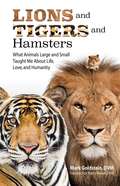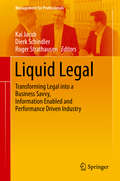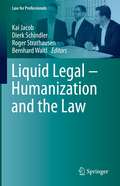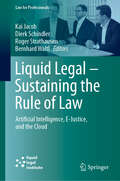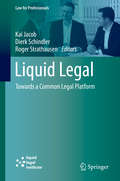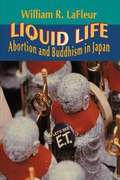- Table View
- List View
Lincoln's Tragic Pragmatism: Lincoln, Douglas, and Moral Conflict
by John BurtA New York Times Book Review Editors’ ChoiceIn 1858, challenger Abraham Lincoln debated incumbent Stephen Douglas seven times in the race for a U.S. Senate seat from Illinois. More was at stake than slavery in those debates. In Lincoln’s Tragic Pragmatism, John Burt contends that the very legitimacy of democratic governance was on the line. In a United States stubbornly divided over ethical issues, the overarching question posed by the Lincoln-Douglas debates has not lost its urgency: Can a liberal political system be used to mediate moral disputes? And if it cannot, is violence inevitable?“John Burt has written a work that every serious student of Lincoln will have to read...Burt refracts Lincoln through the philosophy of Kant, Rawls and contemporary liberal political theory. His is very much a Lincoln for our time.”—Steven B. Smith, New York Times Book Review“I'm making space on my overstuffed shelves for Lincoln’s Tragic Pragmatism. This is a book I expect to be picking up and thumbing through for years to come.”—Jim Cullen, History News Network“Burt treats the [Lincoln-Douglas] debates as being far more significant than an election contest between two candidates. The debates represent profound statements of political philosophy and speak to the continuing challenges the U.S. faces in resolving divisive moral conflicts.”—E. C. Sands, Choice
Lindy Chamberlain: The Full Story
by Ken CrispinThe true story of a mother accused of murdering her baby in the outback of Australia.
Line of Fire: Heroism, Tragedy, and Canada's Police
by Edward ButtsAcross Canada peace officers put their lives on the line every day. From John Fisk in 1804, the first known Canadian policeman killed in the line of duty, to the four RCMP officers shot to death in Mayerthorpe, Alberta, in 2005, renowned true crime writer Edward Butts takes a hard-hitting, compassionate, probing look at some of the stories involving the hundreds of Canadian law-enforcement officers who have found themselves in harm’s way. Some, like the four RCMP officers who perished in the Northwest Territories on the "Lost Patrol" of 1910, died in horrible accidents while performing their duties. Others, such as the Mounties involved in the manhunts for Almighty Voice and the Mad Trapper of Rat River, found themselves in extremely dangerous, violent situations. One thing is certain about all of these peace officers: they displayed amazing courage and never hesitated to make the ultimate sacrifice for their fellow citizens.
Lines in the Sand
by Steve BickerstaffThe events of 2003 in Texas were important to the political history of this country. Congressman Tom DeLay led a Republican effort to gerrymander the state's thirty-two congressional districts to defeat all ten of the Anglo Democratic incumbents and to elect more Republicans; Democratic state lawmakers fled the state in an effort to defeat the plan. The Lone Star State uproar attracted attention worldwide. The Republicans won this showdown, gaining six additional seats from Texas and protecting the one endangered Republican incumbent. This outcome has undeniably affected national policy-making and has made it more difficult for Democrats to regain a majority in the U. S. House of Representatives. Some of the methods used by DeLay to achieve this result, however, led to his criminal indictment and ultimately to his downfall. With its eye-opening research, readable style, and insightful commentary, Lines in the Sand provides a front-line account of what happened in 2003, often through the personal stories of members of both parties and of the minority activist groups caught in a political vortex. Law professor Steve Bickerstaff provides much-needed historical perspective and also probes the aftermath of the 2003 redistricting, including the criminal prosecutions of DeLay and his associates and the events that led to DeLay's eventual resignation from the U. S. House of Representatives.
Lineup
by Liad ShohamInternational bestselling author Liad Shoham makes his American debut in this compelling, superbly plotted crime thriller. After a brutal rape disturbs a quiet Tel Aviv neighborhood, baffled detectives find no clues, no eyewitnesses, and no suspects. The father of the shattered victim refuses to rest until justice is done, so he begins his own investigation. Keeping watch over his daughter's apartment from the street, he notices Ziv Nevo lurking in the shadows. All circumstances--and the victim--point to Nevo's guilt, and it appears the case is closed. But appearances can be deceiving. Detective Eli Nachum is eager to wrap up this high-profile case, which threatens to thwart his career. He sees an easy conviction when the father, determined to succeed where the police have failed, hands over Nevo. But why does the suspect keep silent during the interrogation? What secret is he hiding? What should Nachum and the idealistic young district attorney understand from the suspect's silence?What unfolds is a brilliant, fast-paced story that will keep you guessing until the very last page. Lineup is a twisted tale of mistaken identity, organized crime, a disgraced detective looking for redemption, a tireless young reporter, and an innocent man with a not-so-innocent past. Which lines will they cross and what will they be willing to risk, as their worlds begin to collapse? This seamless, gripping novel introduces a powerful new voice in crime fiction.
Linguistic Diversity and European Democracy
by Anne Lise Kjær Silvia AdamoWhat role does linguistic diversity play in European democratic and legal processes? Is it an obstacle to deliberative democracy and a hindrance to legal certainty, or a cultural and economic asset and a prerequisite for the free movement of citizens? This book examines the tensions and contradictions of European language laws and policy from a multi-disciplinary perspective. With contributions from leading researchers in EU law and legal theory, political science, sociology, sociolinguistic and cognitive linguistics, it combines mutually exclusive and competing perspectives of linguistic diversity. The work will be a valuable resource for academics and researchers in the areas of European law, legal theory and linguistics.
Linguistics and Law (Routledge Guides to Linguistics)
by Jeffrey P. KaplanLinguistics and Law offers a clear and concise introduction to making sense of the law through linguistics. Drawing on lexical semantics, syntax, and pragmatics to interpret both written and spoken laws, this book: addresses how to interpret legal documents such as contracts, statutes, constitutional provisions and trademarks; provides thorough analyses of "language crimes" including solicitation, perjury, defamation, and conspiracy, as well as talk between police and criminal suspects; analyzes the Miranda warning in depth; tackles the question of whether there is a "language" of the law; draws on real-life case studies to aid understanding. Written in an approachable, conversational style and aimed at undergraduate students with little or no prior knowledge of linguistics or law, this book is essential reading for those approaching this topic for the first time.
Linguistics in Pursuit of Justice: Colorblind Ambition
by John BaughAs a black child growing up in inner-city neighborhoods in Philadelphia and Los Angeles, John Baugh witnessed racial discrimination at a young age and began to notice correlations between language and race. While attending college he worked at a Laundromat serving African Americans who were often subjected to mistreatment by the police. His observations piqued his curiosity about the ways that linguistic diversity might be related to the burgeoning Civil Rights movement for racial equality in America. Baugh pursued these ideas whilst traveling internationally only to discover alternative forms of linguistic discrimination in Europe, Africa, Asia, Australia, the Caribbean and South America. He coined the phrase 'linguistic profiling' based on experimental studies of housing discrimination, and expanded upon those findings to promote equity in education, employment, medicine and the law. This book is the product of the culmination of these studies, devoted to the advancement of equality and justice globally.
Linked Democracy: Foundations, Tools, and Applications (SpringerBriefs in Law)
by Marta Poblet Pompeu Casanovas Víctor Rodríguez-DoncelThis open access book shows the factors linking information flow, social intelligence, rights management and modelling with epistemic democracy, offering licensed linked data along with information about the rights involved. This model of democracy for the web of data brings new challenges for the social organisation of knowledge, collective innovation, and the coordination of actions. Licensed linked data, licensed linguistic linked data, right expression languages, semantic web regulatory models, electronic institutions, artificial socio-cognitive systems are examples of regulatory and institutional design (regulations by design). The web has been massively populated with both data and services, and semantically structured data, the linked data cloud, facilitates and fosters human-machine interaction. Linked data aims to create ecosystems to make it possible to browse, discover, exploit and reuse data sets for applications. Rights Expression Languages semi-automatically regulate the use and reuse of content.
LinkedIn® In One Hour for Lawyers
by Dennis Kennedy Allison C. ShieldsLawyers work in a world of networks, connections, referrals, and recommendations. For many lawyers, the success of these networks determines the success of their practice. LinkedIn®, the premier social networking tool for business, can help you create, nurture, and expand your professional network and gain clients in the process. LinkedIn® in One Hour for Lawyers provides an introduction to this powerful tool in terms that any attorney can understand
Linking Conservation and Poverty Reduction: Landscapes, People and Power
by Robert Fisher William Jackson Stewart Maginnis Edmund Barrow Sally Jeanrenaud'This book aims to inspire the conservation community not to regard poverty reduction as someone else's job but to take responsibility for it as part of ecosystem restoration. Though no solutions are perfect,the text and examples given offer encouraging and useful guidance.' Gill Shepherd, poverty and landscapes thematic leader, IUCN Forest Conservation Programme. 'This book could be the catalyst for a real paradigm shift - not just in capital cities and international conference centres, but also on the ground in locations where poor people are struggling to make a living.' Policy Matters (praise for the first edition). High levels of rural poverty in many of the world's ecosystems make it an ethical and practical imperative to find more equitable and realistic ways of achieving conservation. Livelihoods of the rural poor and options for conservation and sustainable use of biological diversity are so intimately entwined that they are better addressed through an integrated approach, irrespective of whether the primary motivation is one of development or one of conservation. This highly accessible book, a revised edition of the 2005 book Poverty and Conservation: Landscapes, People and Power, offers a grand overview of the issues and a conceptual framework for addressing poverty reduction in the context of conservation, and conservation in the context of poverty reduction. It will appeal to professionals working in the field as well as to students across the fields of conservation, development and sustainability. It looks at the rationale for addressing the links between conservation and poverty reduction, arguing that such a focus is both ethically essential and a source of opportunities. It alsoreviews experiences in dealing with people and conservation and identifies some key lessons and concepts. The book presents cases studies illustrating various approaches and a discussion of some of the issues that appear when implementing combined conservation and poverty reduction. The book emphasizes the importance of multiple spatial scales and negotiating trade-offs between scales. It also tackles the complex issue of institutional landscapes and the way in which changes at various institutional levels can lead to different and often more positive outcomes. The Final part summarizes some of the main features of the authors' integrated approach and identifies some of the challenges involved in efforts to combine conservation and poverty reduction. Published with IUCN - The World Conservation Union.
Linking Ecology and Ethics for a Changing World
by J. Baird Callicott Clare Palmer Ricardo Rozzi S. T. A. Pickett Juan J. ArmestoTo comprehensively address the complexities of current socio-ecological problems involved in global environmental change, it is indispiseble to achieve an integration of ecological understanding and ethical values. Contemporary science proposes an inclusive ecosystem concept that recognizes humans as components. Contemporary environmental ethics includes eco-social justice and the realization that as important as biodiversity is cultural diversity, inter-cultural, inter-institutional, and international collaboration requiring a novel approach known as biocultural conservation. Right action in confronting the challenges of the 21st century requires science and ethics to be seamlessly integrated. This book resulted from the 14th Cary Conference that brought together leading scholars and practitioners in ecology and environmental philosophy to discuss core terminologies, methods, questions, and practical frameworks for long-term socio-ecological research, education, and decision making.
Linking Global Trade and Human Rights
by Daniel Drache Lesley A. JacobsDuring the global economic crisis of 2008, countries around the world used national policy spaces to respond to the economic crisis in ways that shed new light on the possibilities for linkages between international trade and human rights. This book introduces the idea of policy space as an innovative way to reframe recent developments in global governance. It brings together a wide-ranging group of leading experts in international law, trade, human rights, political economy, international relations, and public policy who have been asked to reflect on this important development in globalization. Their multidisciplinary contributions provide explanations for why the global landscape for national policy space has changed, clearly illustrate instances of this change, and project the future paths for policy development in social and economic policy spaces, especially with reference to linkages between international trade and human rights in countries from the Global North as well as Brazil, China, and India.
Lion Plays Rough (Leo Maxwell)
by Lachlan SmithLeo Maxwell is a criminal defense attorney on the lookout for the big case that will make his reputation. When a mysterious woman hires him to defend her brother on a murder charge he thinks he may have found it. But things are not what they seem - he's been set up to become the number one enemy of both a vicious gangland boss and the police.Hounded by threats from all sides, he finds himself with a price on his head and framed for murder.Leo's a marked man unless he can somehow turn the tables. But as the bodies pile up and Leo closes in on the truth, he discovers that it is far more sinister than he imagined and forces him question everything that he holds dear...
Lion's Share (Routledge Revivals)
by Mark Wineka Jason LesleyFirst published in 1991, Lion’s Share traces the journey made by Ralph Ketner, his brother Brown, and their friend Wilson Smith as they progressed from opening their first supermarket, Food Town, to running more than 800 stores as part of the Food Lion supermarket chain. The book explores the growth of Food Lion and the reasons for its success, using interviews with the company’s founders and top executives, both those present at the time of publication and previous position holders, to provide a detailed account of its history and development.
Lion's Share: Remaking South African Copyright
by Veit ErlmannIn the aftermath of apartheid, South Africa undertook an ambitious revision of its intellectual property system. In Lion’s Share Veit Erlmann traces the role of copyright law in this process and its impact on the South African music industry. Although the South African government tied the reform to its postapartheid agenda of redistributive justice and a turn to a postindustrial knowledge economy, Erlmann shows how the persistence of structural racism and Euro-modernist conceptions of copyright threaten the viability of the reform project. In case studies ranging from antipiracy police raids and the crafting of legislation to protect indigenous expressive practices to the landmark lawsuit against Disney for its appropriation of Solomon Linda’s song "Mbube" for its hit “The Lion Sleeps Tonight” from The Lion King, Erlmann follows the intricacies of musical copyright through the criminal justice system, parliamentary committees, and the offices of a music licensing and royalty organization. Throughout, he demonstrates how copyright law is inextricably entwined with race, popular music, postcolonial governance, indigenous rights, and the struggle to create a more equitable society.
Lions and Tigers and Hamsters: What Animals Large and Small Taught Me About Life, Love, and Humanity
by Dr. Mark GoldsteinFrom the time Dr. Mark Goldstein was a little boy—even before he had his first dog—he was fascinated by creatures both domestic and wild. After graduating veterinary school at Cornell University, he became a veterinarian in clinical practice, then director of zoos in Boston and Los Angeles, then head of a progressive humane society where he advocated for animal welfare. During his extraordinary 30-year career, Dr. Mark has accrued a lifetime of experiences working with all sorts of animals and the people who care for them. Dr. Mark's life with animals taught him more than how to be a great doctor, it taught him how to live life. The stories in this book reflect those lessons; they will make you laugh and cry as they entertain and amaze you. Each real-life experience sheds light on the challenges and hard work of the talented individuals who work in the world of animal welfare. These are stories that illustrate the tremendous impact animals have on our daily lives—they are hallmarks of the sacred importance of the human-animal bond. On your journey through the exhilarating life of Dr. Mark, you'll meet some of the finned, furred, and feathered animals who offered him invaluable insights—Harold the hamster, Sasha the Siberian tiger, St. Francis the German Shepherd, Ralph the buffalo, Gus the stallion, Frank the goldfish, and many more fascinating creatures!
Lions under the Throne
by Stephen SedleyFrancis Bacon wrote in 1625 that judges must be lions, but lions under the throne. From that day to this, the tension within the state between parliamentary, judicial and executive power has remained unresolved. Lions under the Throne is the first systematic account of the origins and development of the great body of public law by which the state, both institutionally and in relation to the individual, is governed.
Liquid Assets
by Jill BobergMost writings linking demographic trends to water availability often look only at population-growth effects, treating water supplies as static and population as increasing, inexorably leading to a water-availability crisis. This report's more holistic view of the interaction between demographics and water resources considers more demographic and local water-availability variables. It focuses on conditions in developing countries, where these factors intersect with the fewest socioeconomic resources to mediate.
Liquid Legal
by Roger Strathausen Kai Jacob Dierk SchindlerThis book compels the legal profession to question its current identity and to aspire to become a strategic partner for corporate executives, clients and stakeholders, transforming legal into a function that creates incremental value. It provides a uniquely broad range of forward-looking perspectives from several different key-players in the legal industry: in-house legal, law firms, LPO's, legal tech, HR, associations and academia. This publication is a platform for leading legal professionals that offers a new perspective on the accelerating transformation in legal. Combining expert contributions with editorial insights, it argues that the new legal function will shift from a paradigm of security to one of opportunity; that future corporate lawyers will no longer primarily be negotiators, litigators and administrators, but that instead they will be coaches, arbiters and intrapreneurs; that legal knowledge and data-based services will become a commodity; and that analytics and measurement will be key drivers of the future of the profession. A must-read for all legal professionals, this book sets the course for revitalizing the profession.
Liquid Legal – Humanization and the Law (Law for Professionals)
by Roger Strathausen Kai Jacob Dierk Schindler Bernhard Waltl“Humanization and the Law” combines two current and complementary trends in the business-to-business (B2B) market of the legal industry: digitalization and humanization. On the one hand, digital transformation in corporate legal departments and law firms continues to advance. Contract management, e-discovery, due diligence, legal operations, and forensic data analysis are just a few examples of task areas where the use of intelligent software solutions minimizes legal risks and increases compliance, enables efficiency gains and cost reductions through automation, and allows faster and more agile responses to changing market demands and client expectations. On the other hand, the increasing number of failed digitalization projects shows that technology alone is not enough to successfully transform legal departments and law firms. Software solutions must be integrated into existing work processes, be easy to use, and provide real benefits in order to be accepted by employees. People and their ability to make decisions and lead others remain the focus in an increasingly digitalized legal industry. More than 20 authors provide insights into why human aspects matter for business, what organizations can do to increase the mental well-being and motivation of their employees, and how to prevail in the upcoming war for talent in the legal industry. “The legal industry has been largely dismissive of “soft skills” and “humanizing law.” One of the paradoxes of our time is that the ascendency of automation, artificial intelligence, blockchain, Big Data, and other technological platforms has elevated, not diminished, the importance of humanity. It is not only what distinguishes us from machines but it also enables us to apply our humanity to machines. The legal function will play an important role in this process but must first take a hard look at itself.” (Mark A. Cohen, in “Foreword”)
Liquid Legal – Sustaining the Rule of Law: Artificial Intelligence, E-Justice, and the Cloud (Law for Professionals)
by Roger Strathausen Kai Jacob Dierk Schindler Bernhard WaltlThis book is a comprehensive guide for legal, business, and technology professionals seeking to understand the intersection of sustainability and emerging technologies in the legal ecosystem. The book takes a critical look at the role of AI and cloud technologies in promoting sustainable legal practices and addresses the potential risks and ethical considerations associated with these technologies. The book explores the concept of sustainability in a legal context, highlighting the need for the legal system to sustain itself in order to sustain society at large. The chapters cover a wide range of topics, from the use of generative AI and open legal data to promote access to justice, to the codification of corporate cultural intelligence to mitigate risks associated with AI. The book also addresses the potential dark side of AI in the legal market, including the risks of autonomy, liability, legal, and ethical issues that arise when using AI in legal decision-making processes. The authors explore the need for sustainable digital transformation as a prerequisite for sustainable law, highlighting the importance of understanding the ethical and legal implications of AI in the legal system.
Liquid Legal: Towards a Common Legal Platform (Law for Professionals)
by Roger Strathausen Kai Jacob Dierk SchindlerThree years ago, the first Liquid Legal book compelled the legal profession to reassess its identity and to aspire to become a strategic partner for corporate executives as well as for clients. It also led to the foundation of the Liquid Legal Institute (LLI) – an association that sparks innovation and drives collaboration in the legal industry. This second Liquid Legal book builds on the LLI’s progress and on the lessons learned by a legal community that has moved beyond focusing purely on LegalTech. It not only presents an outlook on how legal professionals will operate in the future, but also allows readers to develop a genuine understanding of the value of digitalization, standardization and new methodologies. Further, the book outlines a Common Legal Platform (CLP) and makes it the common point of departure for every author, offering inspiring insights from a wide range of forward-thinking experts who are all invested in driving new thinking within the legal ecosystem. The book also features “Liquid Legal Waves,” which provide links between the various articles, connecting concrete ideas, practical solutions and specific topics and putting them into perspective, and so creating a true network of ideas for readers. A must read, this book is vibrant proof of the power of sharing, collaboration and coopetition, helping the legal profession to shape its digital future and revitalize its relevance while retaining a focus on the human lawyer.
Liquid Legal: Transforming Legal Into A Business Savvy, Information Enabled And Performance Driven Industry (Management For Professionals Series)
by Roger Strathausen Kai Jacob Dierk SchindlerThree years ago, the first Liquid Legal book compelled the legal profession to reassess its identity and to aspire to become a strategic partner for corporate executives as well as for clients. It also led to the foundation of the Liquid Legal Institute (LLI) – an association that sparks innovation and drives collaboration in the legal industry. This second Liquid Legal book builds on the LLI’s progress and on the lessons learned by a legal community that has moved beyond focusing purely on LegalTech. It not only presents an outlook on how legal professionals will operate in the future, but also allows readers to develop a genuine understanding of the value of digitalization, standardization and new methodologies. Further, the book outlines a Common Legal Platform (CLP) and makes it the common point of departure for every author, offering inspiring insights from a wide range of forward-thinking experts who are all invested in driving new thinking within the legal ecosystem. The book also features “Liquid Legal Waves,” which provide links between the various articles, connecting concrete ideas, practical solutions and specific topics and putting them into perspective, and so creating a true network of ideas for readers. A must read, this book is vibrant proof of the power of sharing, collaboration and coopetition, helping the legal profession to shape its digital future and revitalize its relevance while retaining a focus on the human lawyer.
Liquid Life: Abortion And Buddhism In Japan
by William R. LafleurWhy would a country strongly influenced by Buddhism's reverence for life allow legalized, widely used abortion? Equally puzzling to many Westerners is the Japanese practice of mizuko rites, in which the parents of aborted fetuses pray for the well-being of these rejected "lives. " In this provocative investigation, William LaFleur examines abortion as a window on the culture and ethics of Japan. At the same time he contributes to the Western debate on abortion, exploring how the Japanese resolve their conflicting emotions privately and avoid the pro-life/pro-choice politics that sharply divide Americans on the issue.
